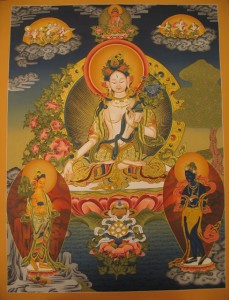The following is an excerpt from a teaching by Jetsunma Ahkon Lhamo called “Neurotic Interaction to Guru Yoga”
When you’re practicing to accomplish pure view, you realize that for you, the teacher is the appearance in the world of a method or a path, a means by which one can enter the door of liberation. This is what makes the teacher precious. The teacher can connect you with the path, can explain the path, can ripen and deepen the mind so that one can practice on the path, and is a spiritual facilitator of a very high caliber. Their activity is extraordinary, or beyond what is normally found in samsara. So you begin, in pure view, to recognize the teacher as being representative of your own true face, the ground of being that is your inherent primordial wisdom nature—that nature which is free of contrivance, free of distinction, completely empty yet completely fulfilled and spontaneously complete. You begin to understand that this teacher is a representation of that nature in the world. The teacher provides the path, the means, the method, the ability to practice, and connects you with that in a very extraordinary way.
Once you’ve determined that, the teacher becomes for you the appearance of the Buddha nature in the world, the appearance of the method or the path in the world, the appearance of the fruition or the accomplishment in the world, the appearance of your own true face in the world. Once the teacher becomes that for you, then to take an opposite viewpoint and to determine a difference of opinion is not a sin or a nonvirtue. It simply argues with what you have already determined for yourself. It’s almost like walking three steps forward and two steps back in your Dharma practice. It’s not that you should become brain dead and that you’re not supposed to have an opinion, but there’s a fine line there that has to be travelled, and it’s pretty difficult to understand what that line is. Now on the one hand you are, and have been raised to be, a person who has a mind that thinks, and you have the ability to connect cause and effect yourself. Hopefully on the path you are developing that clarity of mind more and more and more. Yet here you find a situation where you have also stated clearly “I have found my teacher. Here is this vajra master that I have taken teachings from. That vajra master has facilitated me on the path of Dharma. So how is it that I feel like I have a different opinion at the same time that I have said this is the ultimate, this is the face of the Buddha, this is the Buddhas’ wisdom? How do I negotiate that? What’s that look like for me? I mean, how do I do that?”
Well, let’s stop and think for a moment in a way that might be beneficial. Don’t answer that question right now, but keep it simmering. We’re cooking up some Thanksgiving dinner here. We’re keeping it simmering. Here’s the gravy. It’s simmering on low boil. So now we’re back with the turkey in the oven. But don’t forget, the gravy is still on the boil. You’ve got to keep watching that one! O.K., now, withdraw from that, but still think about answering that question.
Now think about this: You’ve noticed haven’t you, I’m sure you have, that throughout our lives we tend to repeat certain habitual tendencies again and again and again. Can we all agree on that? We have seen certain habitual tendencies. We have seen certain patterns, certain habits. It really depends on how old you are, how convinced you are of this. The older you are, the more time you’ve had to see these things repeat again and again and again. While you’re still young, you think, “Well I’ve only done this two or three times! Who says there’s going to be a fourth, fifth and seventy-fourth!” But by the time you get to be maybe midlife where I am, you’re going, “I’ve seen this movie before!! I have seen this movie before!” And you realize that these habitual tendencies kind of repeat themselves again and again and again, deeply ingrained.
And then if you’re the kind of person who is really insightful, you realize that you project these habitual tendencies onto the circumstances of your life, and without realizing it, will very much control situations and people in your life according to your preconceived notions and according to your habitual tendencies. A difficult situation where you may recognize this is, let’s say, a child that grows up in a house where the child is not given any dignity or any respect and the child feels not loved or abused in some way. So the child develops a certain understanding about that —I am not worthy or I am not lovable—and then goes out into their lives and tends to project some of the same information on others. Others might be perfectly willing to love, be perfectly willing to just do the best they can, not always perfect of course, but to do the best they can, loving them. And yet this person is unable to accept that love and sees the same outcome pretty much all the time and actually is engaged in that outcome. So that’s one situation.
Another situation is, for instance, that of a cat. A cat is actually so strongly habituated towards killing it seems instinctive. From the Dharma point of view, we understand this to be habitual tendency reinforced many many times, life after life, a karmic kind of situation. The cat will be reborn, and even if there is nothing to kill, if you throw a ball of yarn across the room, the cat will go after it. You know what happens when a cat sees flies against the window. If a fly is bumping against the window, the cat will go after that. Anything that scuttles, the cat is after it and their eyes get really big. Have you ever seen a cat look out the window at a bird feeder? Have you ever seen that? The cat makes these horribles noises like “I want those hamburgers! Give me those hamburgers!!” For them it’s like McDonalds in the sky. These animals are so strongly habituated towards killing, that even though they come into this life as a cute little fluffy kitty, those little ears and the little tail and those little feet, still and all, they are killers. They are habituated towards that and the first chance they get, any stimulation, any stimulation, such as the rolling of the ball of yarn across the floor, they will interpret as the hunter and hunted scenario.
Did you know that we do the same thing? We do exactly the same thing. We are so deeply habituated in our own particular tendencies, whatever they are, that we project in the same way onto external stimulation. If we have deeply habituated ideas, sometimes they are bordering on the obsessive and compulsive. Maybe not even bordering, maybe all the way in that country! Pay the toll, we’re in! What happens is once we are strongly habituated into habit, we interpret all stimulation outside as something that keys us into our habitual tendency. So what I find as a teacher and a female, for instance, is that many people interpret me as their mother. They think of me as being the authority figure, someone they have to answer to in that way. They can’t be bad around me. A lot of times the students will… I mean it’s one thing to have your Dharma manners going when you see the teacher—you hold that in respect, and that’s a really good thing—but what I found is that I can walk into a party and kill it, just like that! Because my students suddenly stop functioning. It reminds me of when I was a kid and my mother said ‘dust the living room.’ So I’d be dusting the living room, having fun, thinking about other things, like boys or whatever, and dusting and carrying on. My mother came into the room and I’d suddenly start moving fast! It reminds me a little bit of that.
And sometimes some of my students are habituated towards authority figures in a certain way, and since I must exude some kind of authority, they look at me and interact in the same way with me that they do with other authority figures. So there is this “has to be good girl, good boy or whatever, routine” and the blaming of the teacher and making all of those “I’m mad at you authority figures” kind of scenarios going on. There are all kinds of different gigs, You know what your gig is with authority. Everybody has one. And so they project that onto the teacher. But you see, what’s really happening there is you’re looking at your own habitual tendency—the way that your mind works, the way that it intersects with the time and space grid in front of you, and how you play with your own habitual tendency. What you’re really seeing there is kind of like a bounce-back phenomena that’s actually taking place within your own mindstream.
There is nothing external happening. There is nothing beyond you that is happening. There’s just nothing out there that determines your fate. You’re looking at a kind of almost internal bubble, or a virtual situation in a certain way. You can learn a lot from that kind of virtual reality situation. It’s almost a virtual internal situation that’s happening there.
Copyright © Jetsunma Ahkon Norbu Lhamo. All rights reserved









